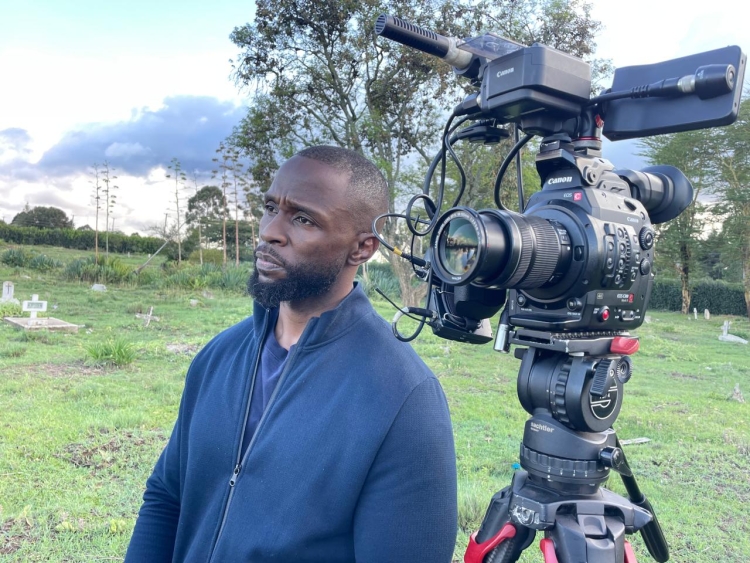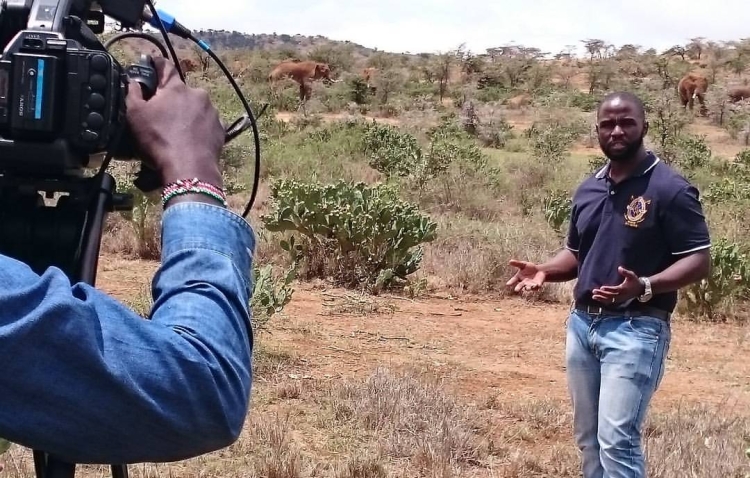In East Africa, Kenya has stood out for its relative peace and prosperity. For over three decades, it has enjoyed multi-party democracy, and largely avoided conflict and war.
This doesn’t mean 2024 ICFJ Knight International Journalism Award winner John-Allan Namu rests easy, however — far from it. The acclaimed Kenyan investigative journalist and co-founder and CEO of Africa Uncensored has dedicated his nearly 20-year career to exposing corruption among the most powerful, human rights abuses, and more in his native country.
“Being the one-eyed man in the kingdom of the blind, it doesn't necessarily say that you are doing well,” said Namu. “And that's all really just carried on and gotten worse with every successive government that has failed to really take these issues into account.”

Namu started his reporting career in 2005 as a broadcast journalist at Kenya Television Network (KTN). During the country’s tumultuous 2007 elections, which saw 1,000 Kenyans killed and another 500,000 internally displaced in its aftermath, Namu became alarmed by how Kenyan media had allowed politically driven narratives to seep into their coverage. His disillusionment grew in subsequent years; he and his colleagues, he felt, couldn’t carry out the truly independent, critical investigations they wished to without being heavily editorialized.
“When you start to see the ugly underbelly of this profession that you’ve fallen in love with, you start to have a different perspective of what your role is, and how long you can survive before you become similar to some of the worst expressions or the worst excesses in your newsroom,” he said.
“It felt like it wouldn't be long before there wouldn't have been much space for us to do really anything, or some of the things, that we wanted to do and true to form.”

Investigating and exposing power
Namu resolved to take charge of the stories he tells, and in 2015 he co-founded Africa Uncensored with two of his KTN colleagues. As the outlet was launched by broadcast journalists, in-depth investigative documentaries are “in the DNA” of Africa Uncensored, Namu said. From inception, its mission has been to “investigate, expose and empower,” with the goal of reporting stories that bring accountability to Kenya.
In 2016, the young newsroom’s reporting on the extortion of street vendors in Nairobi put it on the map, and two years later Africa Uncensored won its first global award for uncovering wartime corruption in South Sudan and the laundering of profits of war into various capitals in East Africa.
Namu’s 2021 investigation as part of the Pandora Papers probed former President Uhuru Kenyatta and his family’s ownership of companies in offshore tax havens. The report, Africa Uncensored’s most widely watched to date with nearly 700,000 views on YouTube, set in motion follow-up reporting from other news outlets on Kenya’s political class, their sources of revenue, and how they manage their money, said Namu.
“We really went in deeply and produced this body of work that directly discussed the wealth of a sitting president and the use of secrecy jurisdictions by him and his family,” he explained. “You kind of see people waking up to the fact that Kenya's political class is really very invested in tax havens and secrecy jurisdictions, which is obviously not good for the country.”
Facing intimidation and threats
Namu's investigations have drawn the eye, and ire, of powerful actors.
Ahead of publishing the Kenyatta investigation, for instance, he and his coworkers were met with intimidation. Fearing reprisal, Namu took his wife and kids and went into hiding for a month — something he has had to do twice before in his career, as well.
“When we sent out our right of response letters to the president and his family through various channels, people reached out to us [...] these were fairly credible people that [said] myself and someone else who I was working with on the story needed to disappear,” he said. “It was a very stark reminder that even in a place like Kenya, that has a far better reputation than other countries can be a very dangerous place for a journalist.”
In just the past year, Namu and his team have been subject to surveillance and DDoS attacks, and targeted with disinformation. Online attacks sought to cast Africa Uncensored as “puppets of the West,” in response to their investigation into Kenya’s economic woes, which the outlet published prior to nationwide anti-tax protests that broke out in the summer.
“What we noticed [...] is that those networks [attacking us] are very well coordinated, have very singular messaging,” said Namu. “[They] are increasingly being used by people who've got money. And it's not just people in politics [...] Anybody who wants to shift narratives or manipulate or manufacture such narratives have become very adept at using these microbloggers and microblogging organizations, some [that] are the actual companies, but others that are just troll farms.”
Meanwhile, SLAPP suits have emerged as an especially effective tactic employed by adversaries to drain Africa Uncensored of its resources and stifle its reporting.
“For a small organization, legal costs upwards of $10,000 a pop can be quite serious for your bottom line and your survival,” said Namu. “If this continues to become a strategy, then we really have to sit down and think very hard about how we'd be able to support our work — and still keep on doing brave work and groundbreaking work — and fight on these two fronts.”

Tips for investigative reporters
Namu recognizes that the challenges he faces as an investigative journalist are, unfortunately, not uncommon. His advice for fellow reporters? Don’t stop, for starters. “Many times a silent majority of people who won't comment on your work, who you will never see, you will never meet — those are the biggest beneficiaries of your work.”
Recognize, too, that passion alone isn’t enough to fuel your work — you’ll risk getting burnt out. Seek out “oases of joy,” he urged. “You can’t pour out of an empty cup,” said Namu. “If disconnecting is your thing to recharge, do that. Or if doing happy stories is your thing, you need to do that.”
“Even if it's just zoning out and going on Netflix or going on walks — anything that really helps you replenish yourself,” he said.
Constantly find small ways to improve, he added. “The profession is always at the cutting edge of technology and new trends and new fads. Being able to ride on that crest is a good thing,” he said. “Become a better storyteller, become a better journalist, one day after another.”
Maintaining authenticity
Receiving this year’s Knight International Journalism Award reminds Namu of how far he has come, with the support of others. He hopes his team at Africa Uncensored “sees a bit of themselves” in the recognition: “They were a very big part, especially for the past almost 10 years, a very big part of why I think ICFJ deigned to give me this award.”
The honor also highlights for Namu how much more he wants to do. Ultimately, he envisions an African Uncensored that outgrows him and his co-founders. The reputation his outlet has built, he acknowledged, means that people in Kenya, across Africa and globally count on him and his team to continue publishing impactful investigations that resonate.
Fundamental to realizing this goal is authenticity — staying true to being Kenyan, and African.
“I want for people across the continent to know that there's a team of people that really care about very good, honest, world-class reporting, and that they are African and that that's who we are,” said Namu.
“It's super important to me that as an African that I'm being true to myself and true to my country and the part of the world that I'm from [...] The work that we do is only important if it stays authentic to who we are.”
This article was first published by IJNet.
Join the ICFJ Tribute to Journalists on Nov. 14 to honor Namu and other intrepid reporters from across the world.